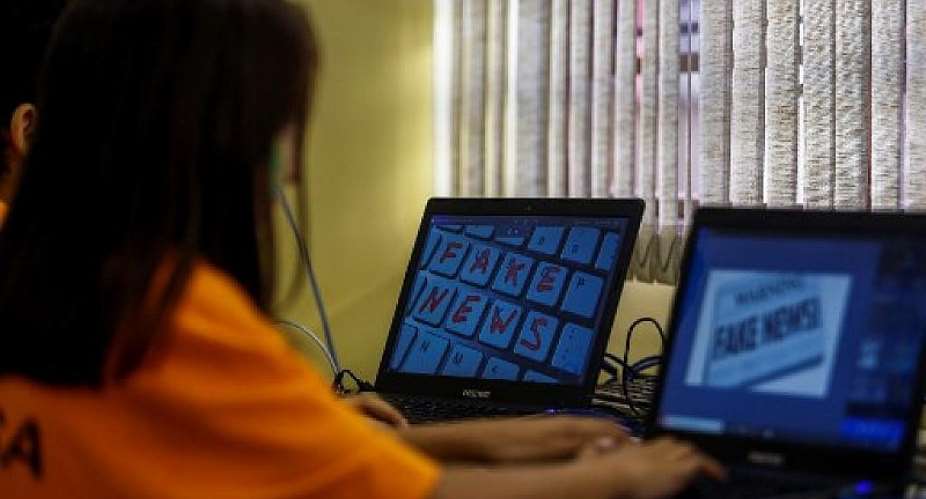European officials have been warning of foreign interference in this week's EU elections for months, but a report on disinformation campaigns in Europe released Wednesday found more suspect activity coming within France and other European countries.
Online activist network Avaaz said it found and reported 500 Facebook pages and groups relaying false information in the European Union, adding that Facebook has deleted or downgraded 77 of these.
France represented 44 of the pages or groups, which Avaaz identified as belonging to networks spreading false information, namely targeting migrants and foreigners.
“In France, we uncovered two networks, and since we sent our investigation to Facebook, the company has downgraded the pages,” said Avaaz campaigner Flora Arduini.
“Also, one page with absolutely outrageous content has been taken down for white nationalism. But the mass of disinformation is still out there and still being spread in France.”
Arduini added that while some messaging is tailored to audiences of different countries, the methods are virtually identical.
“Very similar tactics are used to deceive people: the coordinating and spread of content across pages and groups, and the use of inauthentic or duplicate profiles, or at least suspicious profiles, managing them,” she explains.
“Unfounded claims on recurring topics, such as migration, get into people's minds and have real-life consequences”.
The campaigner said the 500 pages and groups have a combined reach of 32 million users and have generated 67 million interactions (comments, likes, shares, etc.) and 533 million views over the past three months.
But Avaaz also explains it has observed tactics to artificially boost the appearance of widespread support, such as creating what appear to be fan pages or groups for popular athletes, teams, films or celebrities to build a user base before gradually rebranding with political content.
Less foreign, more domestic influence
European officials have been warning of the EU parliamentary election campaign turning into one resembling those in 2016 that led to the votes for Brexit in the UK and Donald Trump in the US, which received widespread accusations of Russian interference.
Heads of French, British and German foreign intelligence services released a joint statement in February warning against interference from abroad, and the presence of former Trump advisor and Breitbart Media founder Steve Bannon in Paris has raised some alarm in France.
But a European diplomatic source told AFP agency that while they were being “particularly careful in the days before the elections”, there was “yet to be a Europe-wide alert”.
AFP also cites another official saying that France, Germany, Romania and the Baltic States targeted by misinformation originating in Russia and Iran, but added that none of these amounted to a “clearly coordinated campaign seeking to influence the vote of a certain category of the electorate”.
Avaaz said its conclusions concurred with those statements, adding that disinformation campaigns it witnessed were coming from within the countries their content was targeting.
“Platforms, politicians and many citizens are worried about foreign interference, but what we're actually seeing here is people from within the countries behind those networks,” Arduini said. “We have not identified foreign interference in our reports.”
Arduini also warns that disinformation campaigns are not limited to the election period and need to be followed on a long-term basis.
“These activities have not just started in the past three or six months, though of course it gets a bit accelerated because they know the vote is critical,” she says.
“We are happy that Facebook act upon our reports, but we don't want this to be focussed only on election periods. It's a long-term game and it has to be a constant action.”
(with wires)





 Former Kotoko Player George Asare elected SRC President at PUG Law Faculty
Former Kotoko Player George Asare elected SRC President at PUG Law Faculty
 2024 elections: Consider ‘dumsor’ when casting your votes; NPP deserves less — P...
2024 elections: Consider ‘dumsor’ when casting your votes; NPP deserves less — P...
 You have no grounds to call Mahama incompetent; you’ve failed — Prof. Marfo blas...
You have no grounds to call Mahama incompetent; you’ve failed — Prof. Marfo blas...
 2024 elections: NPP creates better policies for people like us; we’ll vote for B...
2024 elections: NPP creates better policies for people like us; we’ll vote for B...
 Don’t exchange your life for wealth; a sparkle of fire can be your end — Gender ...
Don’t exchange your life for wealth; a sparkle of fire can be your end — Gender ...
 Ghana’s newly installed Poland train reportedly involved in accident while on a ...
Ghana’s newly installed Poland train reportedly involved in accident while on a ...
 Chieftaincy disputes: Government imposes 4pm to 7am curfew on Sampa township
Chieftaincy disputes: Government imposes 4pm to 7am curfew on Sampa township
 Franklin Cudjoe fumes at unaccountable wasteful executive living large at the ex...
Franklin Cudjoe fumes at unaccountable wasteful executive living large at the ex...
 I'll 'stoop too low' for votes; I'm never moved by your propaganda — Oquaye Jnr ...
I'll 'stoop too low' for votes; I'm never moved by your propaganda — Oquaye Jnr ...
 Kumasi Thermal Plant commissioning: I pray God opens the eyes of leaders who don...
Kumasi Thermal Plant commissioning: I pray God opens the eyes of leaders who don...
